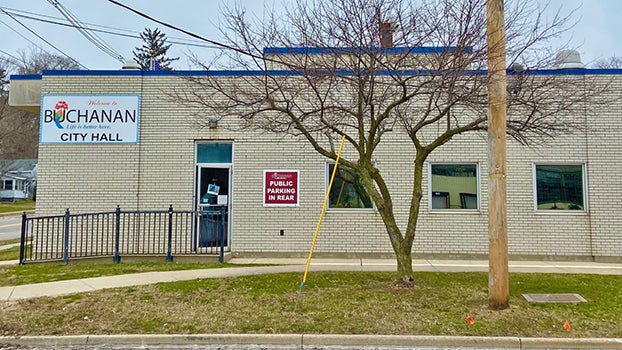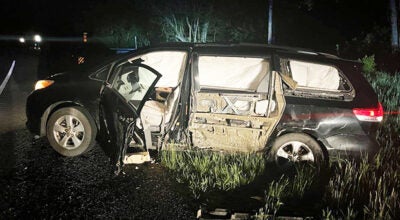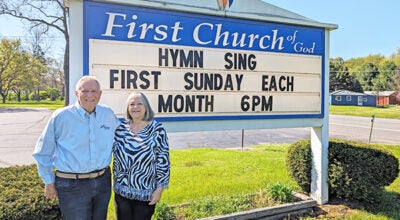Ask Trooper Rob: Michigan prohibits texting while driving
Published 6:13 pm Friday, February 17, 2012
Q: What is the status of the “texting law?” Does Michigan ban the use of cell phones? — Mrs. C from Berrien Springs.
A: Mrs. C., Michigan does not ban the use of cell phones while driving. Be aware though, that it is still a distraction and distractions while driving can be deadly. Law enforcement recommends pulling over when on the phone or at least use hands-free devices.
Concerning texting while driving, the law was recently passed prohibiting this. Motor Vehicle Code 257.602b, Reading, typing or sending text message on wireless two-way communication device prohibited; exceptions; violation as civil infraction; fine; local ordinances superseded states:
“(1) Except as otherwise provided in this section, a person shall not read, manually type, or send a text message on a wireless 2-way communication device that is located in the person’s hand or in the person’s lap, including a wireless telephone used in cellular telephone service or personal communication service, while operating a motor vehicle that is moving on a highway or street in this state. As used in this subsection, a wireless 2-way communication device does not include a global positioning or navigation system that is affixed to the motor vehicle. (2) Subsection (1) does not apply to an individual who is using a device described in subsection (1) to do any of the following: (a) Report a traffic accident, medical emergency, or serious road hazard. (b) Report a situation in which the person believes his or her personal safety is in jeopardy. (c) Report or avert the perpetration or potential perpetration of a criminal act against the individual or another person. (d) Carry out official duties as a police officer, law enforcement official, member of a paid or volunteer fire department, or operator of an emergency vehicle. (3) An individual who violates this section is responsible for a civil infraction and shall be ordered to pay a civil fine as follows: (a) For a first violation, $100.00. (b) For a second or subsequent violation, $200.00. (4) This section supersedes all local ordinances regulating the use of a communications device while operating a motor vehicle in motion on a highway or street, except that a unit of local government may adopt an ordinance or enforce an existing ordinance substantially corresponding to this section.
Trooper’s refusal of bootlegger’s bribe cost him his life
Cpl. Samuel A. Mapes enlisted in the Michigan State police on March 28, 1924, and was patrolling solo on old M-23, east of Sturgis, on May 1, 1927. He was assigned to the Paw Paw Post at the time and was 33 years old.
Mapes pulled over two suspiciously laden westbound cars that were apparently traveling together. One was a St. Clair Roadster driven by Charles Coffey, a Chicago bootlegger, and the other a Packard, driven by Coffey’s co-hort. Mapes soon realized he had nabbed a pair of bootleggers headed back to Chicago with a load of contraband Canadian whiskey.
Coffey offered Mapes a bribe of $300, a tidy sum in those days, if he would let Coffey go on with his cargo.
Mapes refused the bribe and flagged down a passing motorist who had stopped to offer assistance. Mapes asked the motorist to go to Sturgis and summon local officers for assistance.
At that time, Coffey, who was behind Mapes, pulled out a Luger pistol, jerked Mapes’ revolver from its holster, and spun Mapes around, shooting him point blank in the chest with the Luger. An intense investigation began and it was soon discovered that Coffey was the killer.
A stakeout with MSP detectives and troopers, along with Chicago police officers, found Coffey at his Chicago home.
One of Chicago’s most sensational high-speed chases took place, ending when Coffey crashed and was arrested.
Mapes’ revolver was discovered in Coffey’s home and he was ultimately found guilty of murder in Michigan and sentenced to life in prison.
This case prompted the department to open a detachment in Sturgis and to also adopt a cross-draw holster with snapping flap covers.
Considering the rampant official corruption and low public regard for law enforcement during Prohibition, Mapes refusal to accept a bribe at the cost of his own life profoundly enhanced the image of the Michigan State Police.
In 1929, the new Uniformed Division Headquarters was named Mapes Hall in his honor. Gov. Fred Green told the crowd at the dedication that he received strong political pressure to pardon Coffey. Green refused and charged his successors to never pardon Coffey.
Those words were fulfilled and Coffey died in prison of natural causes in 1961.
Mapes received a posthumous Valor Medal in 1930 and was the seventh trooper to die in the line of duty.
Send your questions and comments to trooperrob53@yahoo.com.






